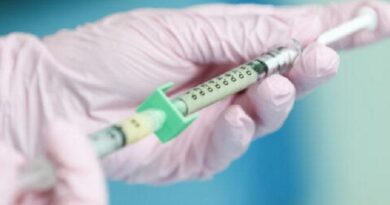Pregnant or Lactating Women
HEALTH
The COVID-19 Vaccine for Pregnant or Lactating Women
by Olga Alvarez Lopez
 Are you pregnant or are you breastfeeding your baby? It is recommended that you receive the COVID-19 vaccine to protect yourself and your baby. Unfortunately, the COVID-19 infection is worse in pregnant women than in nonpregnant women; they have higher numbers of intensive care and mechanical ventilation. In addition, they are at a higher risk of having a premature birth and suffering other pregnancy complications. Hispanic and Black women are disproportionally more affected during pregnancy than other groups. On the contrary, receiving the vaccine while you are pregnant produces antibodies against the virus that causes the COVID-19 infection. These antibodies prevent you from becoming sick and reduce the risk of the complications associated with this infection.
Are you pregnant or are you breastfeeding your baby? It is recommended that you receive the COVID-19 vaccine to protect yourself and your baby. Unfortunately, the COVID-19 infection is worse in pregnant women than in nonpregnant women; they have higher numbers of intensive care and mechanical ventilation. In addition, they are at a higher risk of having a premature birth and suffering other pregnancy complications. Hispanic and Black women are disproportionally more affected during pregnancy than other groups. On the contrary, receiving the vaccine while you are pregnant produces antibodies against the virus that causes the COVID-19 infection. These antibodies prevent you from becoming sick and reduce the risk of the complications associated with this infection.
But first, what are antibodies? Antibodies, also called immunoglobulins, are proteins created by your immune cells in response to bacteria, viruses, and other microorganisms. These antibodies work in different ways to attack these organisms. When you are pregnant, these antibodies are transmitted to your baby through the umbilical cord. While you are breastfeeding your baby, these antibodies are transmitted directly through breastmilk. When you get vaccinated, you provide protection against COVID-19 to your baby from the moment they are born and when you are breastfeeding.
Have you had the COVID-19 infection already and are not sure if it is worth receiving the vaccine? It has been demonstrated that women who receive the vaccine produce significantly more antibodies than women who only had the infection. This means more protection for you and your baby.
You can receive any of the vaccines available in the United States. You might experience side effects, but these are typical signs that your body is generating protection. The side effects are not any different in pregnant women when compared to the rest of the population. These can include pain, swelling at the site, fever, chills, fatigue, headaches, or muscle aches. You can take acetaminophen (Tylenol) if you have fever or other side effects after receiving the vaccine.
Receiving the vaccine is your personal decision. If you have any questions, you can contact the organization “Mother to Baby,” and you can visit https://mothertobaby.org/ask-an-expert/, or call 1-866-626-6847 for more information in either English or Spanish. To obtain a COVID-19 vaccine in New York state, you can visit https://covid19vaccine.health.ny.gov/, or call 1-833-697-4829 to schedule an appointment.
References:
- https://www.acog.org/clinical/clinical-guidance/practice-advisory/articles/2020/12/covid-19-vaccination-considerations-for-obstetric-gynecologic-care
- https://www.cdc.gov/vaccines/covid-19/clinical-considerations/covid-19-vaccines-us.html?CDC_AA_refVal=https%3A%2F%2Fwww.cdc.gov%2Fvaccines%2Fcovid-19%2Finfo-by-product%2Fclinical-considerations.html#pregnant
- https://www.cdc.gov/coronavirus/2019-ncov/vaccines/recommendations/pregnancy.html
- https://www.ajog.org/article/S0002-9378(21)00187-3/fulltext
- https://www.cdc.gov/coronavirus/2019-ncov/vaccines/expect/after.html

Olga Alvarez Lopez is a student in her final year at the University of Rochester School of Medicine. She was born and raised in Caguas, Puerto Rico. She completed her bachelor’s degree at the University of Pittsburgh where she majored in Biology and Sociology. During her time in Rochester, she was on the executive board of the local chapter of the Latinx Medical Student Association (LMSA). Currently, she is applying to Internal Medicine residencies.
Photos of pregnant woman and woman with a baby by Vlada Karpovich and Laura García de Pexels


